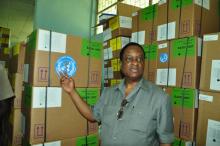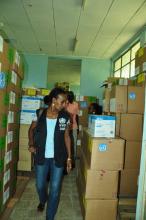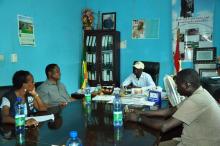WHO Commits to Improve Health Situation in Gambella, Ethiopia
Increasing reports of communicable diseases and presence of a large number of refugees from south Sudan heightened the need for strengthened public health emergency preparedness and response in Gembella Region.
“WHO commits again as a partner to ensure working together to improve the health situation of people of Gambella and hundred thousands of refugees from South Sudan” said Dr. Pierre M’Pele-Kilebou, WHO Representative to Ethiopia as he handed over Emergency Health Kits to Gambella Regional Health Bureau (RHB) .
WHO handed over the Emergency Health Kit (EHK) to RHB on 20 October 2015. The EHKs are enough to benefit over 40,000 people with different communicable diseases for three months. Appreciating the contribution, Dr. Lou Obub, Head of RHB, said the emergency Health kits will be used to provide services to the host as well as refugees communities in Gambella. “There is a lot of work that still needs to be done in the health sector and we need to join hands to take actions and solve all the problems,” he added.
Over the last five years, WHO has been working closely with RHB and the Administration for Refugee and Returnee Affair (ARRA) and strengthened support to emergency response and preparedness in the region. Due attention was given to capacity building of the health system, strengthening disease surveillance and conducting public health risk assessments.
WHO has also been collaborating with other UN Agencies and international NGOs and partnered with donors such as Government of Japan and ECHO to improve health situation of both refugees and host communities in the region. The United Nations’ Emergency Response Fund (ERF) has also been utilized to respond to the refugee crisis in the region and to prevailing public health emergencies in the host communities. According to UNHCR there are nearly 280,000 South Sudanese refugees in Gambella region. Around 84% of them are housed in six refugee camps and the remaining 16% resides within the host community.
For more information, please contact
Kibnesh Chala,
Communications Officer
chalak [at] who.int
Photo: WHO Ethiopia/Kibnesh C.



